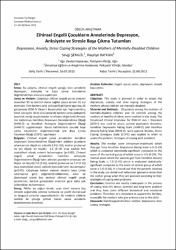Zihinsel engelli çocukların annelerinde depresyon, anksiyete ve stresle başa çıkma tutumları
Özet
Amaç: Bu çalışma, zihinsel engelli çocuğu olan annelerin depresyon, anksiyete ve başa çıkma tutumlarını değerlendirmek amacıyla yapılmıştır. Gereç ve Yöntem: Çalışmaya zihinsel engelli çocuk anneleri arasından 50 ve kontrol olarak sağlıklı çocuk annesi 50 kişi alınmıştır. Tüm katılımcılarla psikiyatrik görüşme yapılmış, ilk görüşmede DSM-IV Eksen-I Bozuklukları için Yapılandırılmış Klinik Görüşme (SCID-I) kullanılarak katılımcılarda psikiyatrik bozukluk varlığı araştırmacılar tarafından değerlendirilmiştir. Her katılımcıya Hamilton Depresyon Derecelendirme Ölçeği (HAM-D) ve Hamilton Anksiyete Değerlendirme Ölçeği (HAM-D) uygulanmıştır. Ayrıca katılımcılara sorunla başa çıkma tutumlarını değerlendirmek için Başa Çıkma Tutumları Ölçeği (COPE) yapılmıştır. Bulgular: Zihinsel engelli çocuk annelerinin Hamilton Depresyon Derecelendirme Ölçeği’nden aldıkları puanların ortancası (en düşük-en yüksek) 6.0 (1-23), kontrol grubunun ise (en düşük- en büyük) 4.5 (0-19) olup aradaki fark istatistiksel olarak anlamlı bulunmuştur (p<0.05). Zihinsel engelli çocuk annelerinin Hamilton Anksiyete Değerlendirme Ölçeği’nden aldıkları puanların ortancası (en düşük -en büyük) 7.0 (2-41), kontrol grubunun ise 5.0 (0-16) olup istatistiksel olarak anlamlı derecede farklı bulunmuştur (p<0.05). Çalışmaya katılan anneler sorunla başa çıkma tutumlarına göre değerlendirildiklerinde, inkar ve davranışsal olarak boş vermeyi zihinsel engelli çocuk annelerinin, kontrol grubundaki annelere göre daha çok kullandıkları bulunmuştur. Sonuç: Aileler bu yoğun stresli, uzun süreli sorunla baş etmede çoğunlukla yetersiz kalmakta ve çeşitli davranışsal ve duygusal sorunlar yaşamaktadırlar. Bu nedenle ailelerin özelikle de çocuğa primer bakım veren annelerin desteklenmesi önemlidir. Objective: This study is planned in order to assess the depression, anxiety and stres coping strategies of the mothers whose children are mentally-disabled Material and Methods: 50 patients among the mothers of mentally-disabled children and 50 controls among the mothers of healthy children, were involved in the study. The Structured Clinical Interview for DSM-IV Axis I Disorders (SCID-I) was used to assess current psychiatric disorders. Hamilton Depression Rating Scale (HAM-D) and Hamilton Anxiety Rating Scale (HAM-D) were applied. Besides, Stress Coping Strategies Scale (COPE) was applied in order to assess the patients’ strategies of coping with problems. Results: The median score (minumum-maximum) which they got from Hamilton Depression Rating Scale is 6 (1-23) which is evaluated statistically-significant compared to the score of the control group of which score is 4.5 (0-19). The median score which the patients got from Hamilton Anxiety Rating Scale is 7.0 (2-41) which is evaluated statistically- significant compared to the score of control group of which score is 5.0 (0-16). It is found out that the patients involved in the study use denial and behavioral ignorance more than the control group when they are assessed according to their strategies of coping with problems. Conclusion: Families are mostly inadequate in the process of coping with this dense, stressful and long-term problem and they have some different behavioral and emotional problems. Therefore, it is important to support the families, especially the mothers who give primary care to the child.
















